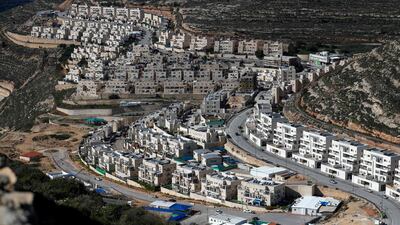Israel approved about 3,000 new settler homes in the occupied West Bank on Wednesday, a day after the US issued its strongest rebuke yet of building residences in settlements.
It was the biggest announcement of settlement plans during the US administration of President Joe Biden.
The plans were approved by a Defence Ministry committee, a security official said. The anti-settlement group Peace Now confirmed the approvals.
The decision marked the latest boost for Israel’s settlement enterprise, largely regarded as illegal by the international community, on occupied lands the Palestinians seek for a state.
Successive Israeli governments have expanded settlements, making a two-state solution to the Palestinian-Israeli conflict increasingly difficult.
Palestinian President Mahmoud Abbas called on the international community to take a “decisive stance” on the Israeli decision, which he called a “message of disdain for the efforts of the US administration.”
The administration of former president Donald Trump tolerated settlement growth and abandoned the decades-long US position that they were illegitimate.
Israel built the homes aggressively during the Trump years, advancing plans for more than 12,000 settler homes in 2020, the highest number since Peace Now started collecting data in 2012.
Wednesday’s decision was bound to raise friction with Europe and the US.
On Tuesday, US Secretary of State Antony Blinken protested against the plan in a phone call with Israeli Defence Minister Benny Gantz, a senior US official said.
Also on Tuesday, the US State Department said it was “deeply concerned” about Israel’s plans to advance new settlement homes, including many deep inside the West Bank.
“We strongly oppose the expansion of settlements, which is completely inconsistent with efforts to lower tensions and to ensure calm and damages the prospects for a two-state solution,” State Department spokesman Ned Price said.
Sabri Saidam, a former Palestinian official, criticised the Biden administration, saying it was “almost absent” as Israel pushed ahead with settlement construction.
The approval could test Israel’s fragile governing coalition of ultra-nationalists, centrists and peaceful parties that oppose settlements after the 12-year rule of former Prime Minister Benjamin Netanyahu.
“Now everybody knows that this is not a government of change, but this is a government with the same policy as Netanyahu to build more settlements, to deepen the occupation and to take us away from the chances for peace,“ said Hagit Ofran of Peace Now.
The Palestinians seek the West Bank, the Gaza Strip and East Jerusalem for their state. They regard the settlements, which house about 700,000 Jewish Israelis, as the main obstacle to peace.
Israel considers the West Bank, home to more than 2.5 million Palestinians, to be the biblical and historical heartland of the Jewish people.
Wednesday’s approvals were given by the Defence Ministry’s higher planning council, which authorises West Bank construction. About half of the units were given final approval before the start of construction.
The committee was also supposed to approve 1,300 housing units for Palestinians who live in areas of the West Bank that are under full Israeli control, outside the enclaves administered by a Palestinian autonomous government. The discussion was moved to next week.
The Palestinians and rights groups say the 1,300 homes meet a tiny fraction of the need. Palestinians require military permits to build in the 60 per cent of the occupied West Bank that is under full Israeli control.
Rights groups say permits are almost never granted, forcing many residents to build without authorisation, putting their homes at risk of demolition.
On Sunday, Israel announced building tenders for 1,355 housing units in the West Bank, the first move of its kind since Mr Biden assumed office pledging to take a harder line on settlements.
It went against the new Israeli coalition government’s vows to reduce tension with the Palestinians.


